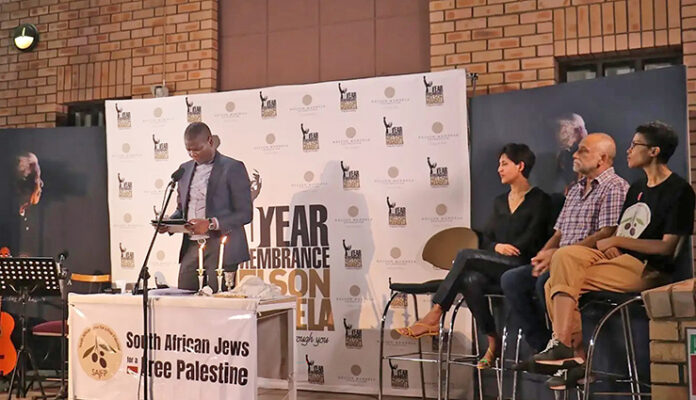Umuntu ngumuntu nga-bantu is one of the values that not only permeates through the spirit and text of our Constitution; it is also the DNA of South Africa. Ubuntu is what former president Nelson Mandela taught us.
Recently, I had the privilege of being hosted by the Nelson Mandela Foundation and the South African Jews for a free Palestine at a sacred service, the Shabbat.
It turned out to be a true reflection of a nation united in diversity. All were welcome, irrespective of religion. The gathe-ring affirmed we can live in harmony with each -other as South Africans. It affirmed the secu-larity of our state.
I was moved by a statement made by the acting CEO of the foundation, Professor Verne Harris, who said: “We make a terrible mistake in South Africa when we listen to -only one domi-nant institutional Jewish voice. There are many other voices this evening.”
As I write this piece to engage you fellow Sunday World readers, I am reminded of a -letter written by the commissioner-general of the Uni-ted Nations Relief and Works Agency for Palestine to the president of the UN General Assembly on February 22.
“Palestinian children are starving to death as a direct result of the deliberate acts and omissions of Israel – in violation of the Genocide Convention and of the court order [of the International Court of Justice].
“This includes Israel’s deli-berate attempts to cripple the United Nations Relief and Works Agency, on whom the vast majority of besieged, displaced and starving Palestinian men, women, children and babies, depend for their survival.”
It is in this context we argue that the principle of ubuntu extends beyond our borders and has the potential to shape glo-bal discourse on human rights. Ubuntu teaches us that we are interconnected and that our actions have a ripple effect on others.
In the context of human rights, ubuntu challenges us to go beyond legal frameworks and institutional mechanisms. It calls for a deeper understanding of the interconnectedness of all human beings and the recognition that our well-being is intertwined with that of others.
Ubuntu also reminds us of the importance of collective responsibility. It encourages us to work together to build a society that upholds the rights and dignity of all. It challenges systems that perpetuate inequali-ty and discrimination. It promotes inclusivity and social justice.
In South Africa, the values of ubuntu have been instrumental in the process of reconciliation and nation-building. It has gui-ded our efforts to heal the wounds of the past and build a society based on equality, justice and respect for human rights.
However, it is vital to acknow-ledge that racial inequality persists in South Africa, despite our transformative journey towards democra-cy. We took an important step inspired by the Holocaust’s “Never Again” principle, vowing to prevent the oppression of one by another.
Madiba in his inauguration speech as president of SA echoed this sentiment, declaring that our country would never again be subjected to such indignity. Our predecessors, such as Dullah Omar, endorsed international agreements such as the Genocide Convention and the Rome Statute, reaffirming our commitment to a more compassionate society and a world free from injustice.
Africa herself is not at peace, the guns, violence and acts of terror reign over peace and security and the ballot box in some parts of our continent.
By approaching the Internatio-nal Court of Justice, we sought to affirm the values that Mandela bequeathed us. This is not just an issue that concerns SA. It is a matter that resonates deeply with the collective consciousness of the global community.
Our country endured a dark period marked by crimes against humanity. The echoes of state-sponsored violence, primarily manifesting as racial injustice, are still reverberating today, casting long shadows over our present.
The threat of injustice continues to threaten our peace and stability. The timeless words of Martin Luther King Jr that “Injustice any-where is a threat to justice everywhere”, hold true.
We stand up for what is right. We are committed to ensuring that such heart-breaking atroci-ties are not repeated.
Madiba once said: “Our daily deeds as ordinary South Africans must produce an actual South African reality that will reinforce humanity in justice, strengthen its confidence in the nobility of the human soul, and sustain all our hopes for a glorious life for all.”
We remain steadfast in our support for the Palestinian people’s pursuit of justice and self-determination. We believe that through international collaboration, adherence to international law, and addressing the root causes of the conflict, a just and enduring peace can be achieved, benefiting both Israel and Palestine.
- Lamola is minister of justice and correctional services



